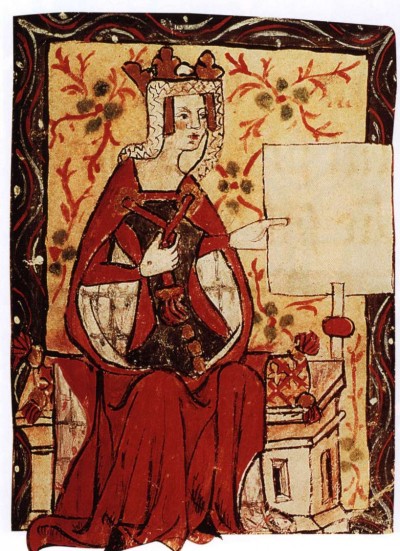Empress Matilda (Empress Matilda)

Empress Matilda (c. 7 February 1102 – 10 September 1167), also known as the Empress Maude, was the claimant to the English throne during the civil war known as the Anarchy. The daughter of King Henry I of England, she moved to Germany as a child when she married the future Holy Roman Emperor Henry V. She travelled with her husband into Italy in 1116, was controversially crowned in St. Peter’s Basilica, and acted as the imperial regent in Italy. Matilda and Henry had no children, and when he died in 1125, the crown was claimed by Lothair II, one of his political enemies.
Meanwhile, Matilda’s younger brother, William Adelin, died in the White Ship disaster of 1120, leaving England facing a potential succession crisis. On Henry V’s death, Matilda was recalled to Normandy by her father, who arranged for her to marry Geoffrey of Anjou to form an alliance to protect his southern borders. Henry I had no further children and nominated Matilda as his heir, making his court swear an oath of loyalty to her and her successors, but the decision was not popular in the Anglo-Norman court. Henry died in 1135 but Matilda and Geoffrey faced opposition from the Norman barons and were unable to pursue their claims. The throne was instead taken by Matilda’s cousin Stephen of Blois, who enjoyed the backing of the English Church. Stephen took steps to solidify his new regime, but faced threats both from neighbouring powers and from opponents within his kingdom.
In 1139 Matilda crossed to England to take the kingdom by force, supported by her half-brother, Robert of Gloucester, and her uncle, King David I of Scotland, while Geoffrey focused on conquering Normandy. Matilda’s forces captured Stephen at the Battle of Lincoln in 1141, but the Empress’s attempt to be crowned at Westminster collapsed in the face of bitter opposition from the London crowds. As a result of this retreat, Matilda was never formally declared Queen of England, and was instead titled the Lady of the English. Robert was captured following the Rout of Winchester in 1141, and Matilda agreed to exchange him for Stephen. Matilda became trapped in Oxford Castle by Stephen’s forces that winter, and was forced to escape across the River Isis at night to avoid capture. The war degenerated into a stalemate, with Matilda controlling much of the south-west of England, and Stephen the south-east and the Midlands. Large parts of the rest of the country were in the hands of local, independent barons.
Matilda returned to Normandy, now in the hands of her husband, in 1148, leaving her eldest son to continue the campaign in England; he eventually succeeded to the throne as Henry II in 1154. She settled her court near Rouen and for the rest of her life concerned herself with the administration of Normandy, acting on Henry’s behalf when necessary. Particularly in the early years of her son’s reign, she provided political advice and attempted to mediate during the Becket controversy. She worked extensively with the Church, founding Cistercian monasteries, and was known for her piety. She was buried under the high altar at Bec Abbey after her death in 1167.
Born
- February, 07, 1102
- Sutton Courtenay, Oxfordshire, England
Died
- September, 10, 1167
- Rouen, France
Cemetery
- Cathédrale Notre-Dame de Rouen
- Rouen, Haute-Normandie, France

